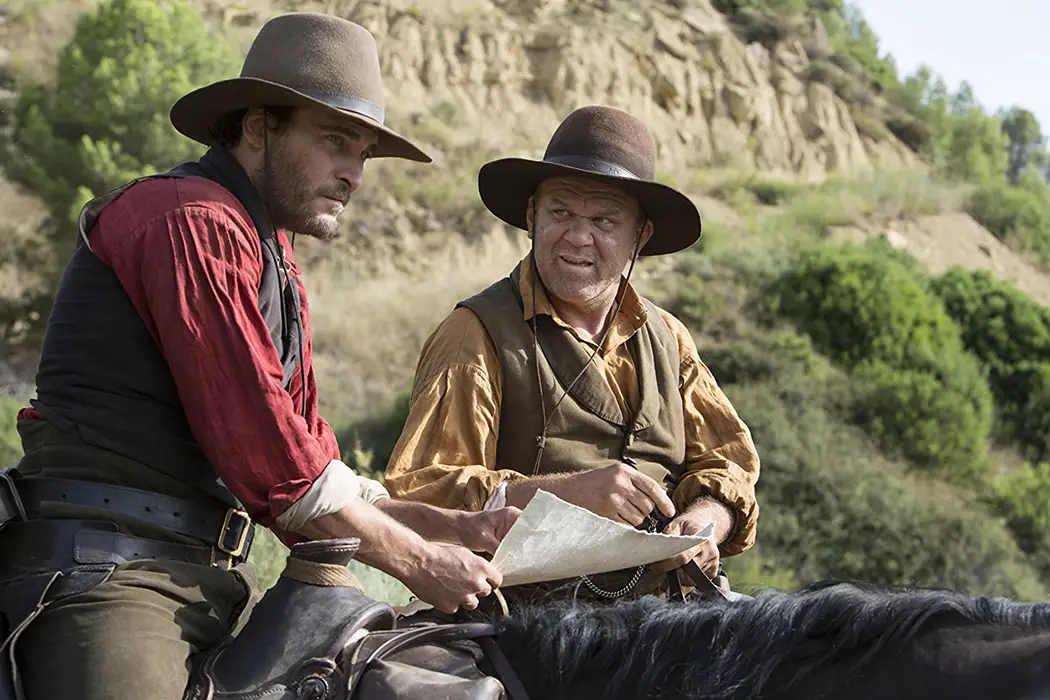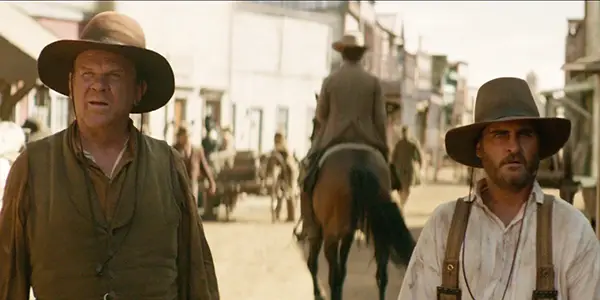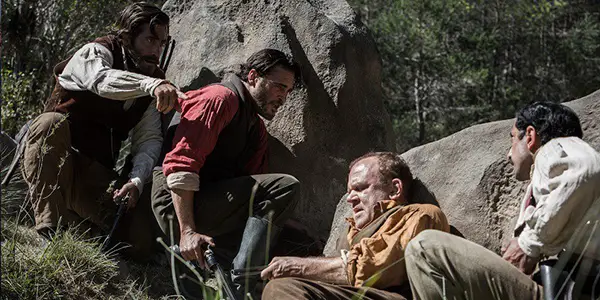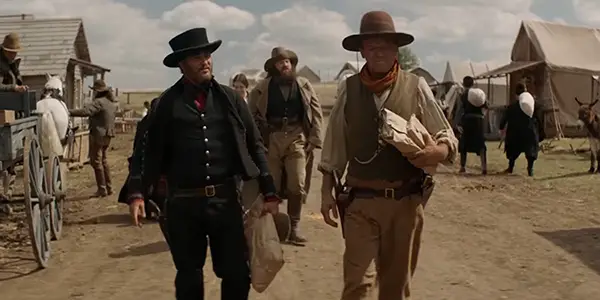THE SISTERS BROTHERS: Quiet Western Subverts Expectations

David is a film aficionado from Colchester, Connecticut. He enjoys…
Admittedly, it’s not too easy to define The Sisters Brothers. From Jacques Audiard, a director familiar with slower, more arthouse-oriented films, it also tells the story of two assassin brothers on the search for their newest victim. Audiard‘s approach to the story is not entirely different from his typical fare, and yet, somehow the two contradictions of slow-mannered approach with high-energy subject did not feel at odds with one another. The result is a film not entirely separated from the action genre that it falls into, yet also one much more focused on the contemplative nature of its characters than anything else. It’s a whisper of a film, but one that’s worth listening to.
The Gold Rush
It is the 1850s in the American Old West. Charlie (Joaquin Phoenix) and Eli (John C. Reilly) Sisters are two brothers that are well-known for their ruthless gun-wielding abilities. Hired by the high-ranking Commodore (Rutger Hauer) for their latest job, they are sent to hunt down Hermit Kermit Warm (Riz Ahmed), who has already been scoped out by scout John Morris (John Gyllenhaal). Their job is to torture Warm in order to receive the recipe for a special gold-finding formula that Warm had created, before then killing him.
Along the way, though, the brothers run into their fair share of issues, caused in part by Charlie’s impulsive nature and Eli’s hesitancy to get his hands dirty. It all leads to them beginning to question their allegiances before they finally meet up with Warm and Morris, and whether or not to sever ties with the Commodore altogether and live their own lives.
Slow But Steady Pace
Where I fear The Sisters Brothers might lose people (and already seems to be, given its middling box office), is in its layout. Through its subject and scope, and even the Western genre as a whole, one would expect the film to be chockful of duels and gunfights, all leading to a triumphant final battle.

Yet, though there are a few gunfights throughout, including the opening scene itself, even here Audiard doesn’t necessarily focus in on the fights themselves. Rather than show guns blazing and blood being shed, he is much more focused on the act of killing. For example, during one scene both the Sisters Brothers have to fight off a group of men near a river, yet the actual kills are shown from behind some trees, and the final kill is much more focused on the brothers’ worn-out faces than on the man being shot.
The Sisters Brothers, as we soon find out, is not a glorification of the old West; instead it is simply a glimpse at its uncomfortable violence, and what it often did to both the people being shot and to those doing the shooting. Violence has a way of turning back on you, the brothers soon find out, and perhaps that is a lesson they should take to heart.
The Brothers (and Company)
The Sisters Brothers triumphs with its building of character. The brothers themselves are a less than ideal pair of polar opposites, with the free-wheeling Charlie often having to be grounded by the more sensible Eli, and both Phoenix and Reilly are wholeheartedly committed to these roles. Despite the clear rifts between them, through it all they show their mutual love for each other, showing that this relationship is built off more than just the ability to shoot a gun. There’s a lot to be said here for the roles that family plays in one’s choices in life, including the inescapable influence of parents on their children, and Audiard leans into these themes strongly throughout the film.
Reilly in particular gives a sensitive performance as the down-to-earth yet also quite lonesome Eli. There’s a sense throughout The Sisters Brothers that Eli carries a huge weight on his shoulders, a burden we discover later on, and Reilly is firmly captivating in the role. Being just one of three duo films coming out this year starring the actor – the others being Stan and Ollie and Holmes and Watson – it’s clear that Reilly is just inherently comfortable playing a second fiddle character. Though here, he just may steal the film out from under the remainder of the cast in the process.

Standing opposite the two brothers is Morris and Warm, both also devotedly played by Ahmed and Gyllenhaal. Warm is hopeful for humanity, and Ahmed brings a warmth (no pun intended) to the performance. Despite his wish for gold, Warm is determined not to acquire it for greedy purposes but instead to start a new civilized society down south. His sincerity inspires Morris, believably shown by Gyllenhaal, who though not necessarily of the belief that such a society could work, is determined to earn his freedom from work under the Commodore.
When the four come together, their differing perspectives on life are seen in further clarity. The free-spirited, albeit in widly differing ways, Charlie and Morris find themselves drawn to each other, while Warm and Eli find mutual respect as well, sharing one of the film’s most raw moments. Though it may be too sentimental for some, it’s this tender approach that The Sisters Brothers didn’t necessarily have to bring, but with both Patrick deWitt’s poetically resonant words and Audiard‘s steadfast direction, it succeeds with aplomb.
Capturing the Old West
Where Audiard‘s film undoubtedly knocks it out of the park is with its pristine Western setting. Taking place primarily in the northwest mountains of Oregon and the West coast, it wonderfully captures a slice of the frontier, shown in the wide-spanning landscapes that Charlie and Eli traverse through on horseback and alternatively with the bustling towns they visit.

San Francisco in particular is shown as full to the brim with people, since it takes place during the Gold Rush of the 1850s. The juxtaposition between vacant landscapes and claustrophobic crowds is jarring, which adds much to the film’s dual nature. Audiard, like the great Western directors, recognizes the importance of the landscape at this time, which was a character unto itself back in the pioneering days of our country.
Conclusion: The Sisters Brothers
Despite everything working for it, The Sisters Brothers is a film that will likely be overlooked by many. Its slow, meditative nature may be lost on those looking for an action-oriented fun time at the movies. Even the comedy that seemingly is meant to be an integral part of the film very much feels lacking.
Yet, there is much to admire here as well, whether it be the powerhouse performances of the four main actors, the beautifully captured cinemtography, or the film’s more revisionist statement on the nature of violence in the Old West. Like a passing breeze, The Sisters Brothers may come and go, but if you stop and let it wash over you, it just might linger.
What are your thoughts on The Sisters Brothers? Are you a fan of slower, more arthouse-oriented Westerns? Let us know in the comments below!
The Sisters Brothers was released to U.S. theathers on October 19th, 2018. It will be released in the UK on April 5th, 2019.
Does content like this matter to you?
Become a Member and support film journalism. Unlock access to all of Film Inquiry`s great articles. Join a community of like-minded readers who are passionate about cinema - get access to our private members Network, give back to independent filmmakers, and more.
David is a film aficionado from Colchester, Connecticut. He enjoys writing, reading, analyzing, and of course, watching movies. His favorite genres are westerns, crime dramas, horror, and sci-fis. He also enjoys binge-watching TV shows on Netflix.













